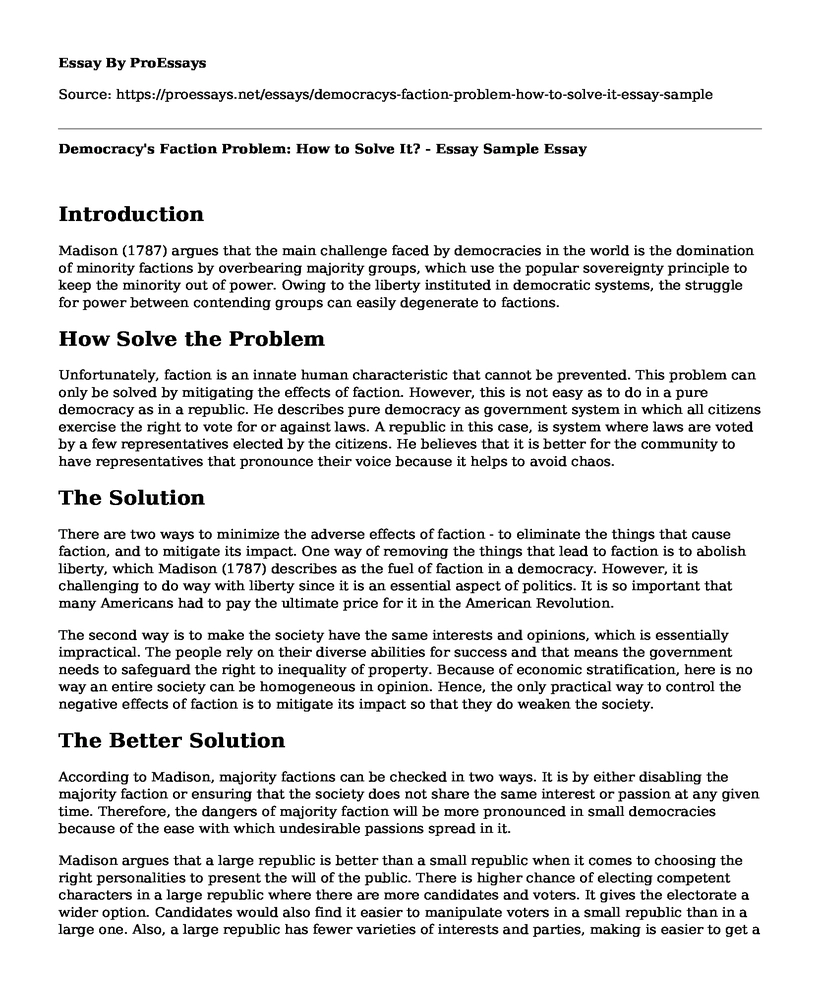Introduction
Madison (1787) argues that the main challenge faced by democracies in the world is the domination of minority factions by overbearing majority groups, which use the popular sovereignty principle to keep the minority out of power. Owing to the liberty instituted in democratic systems, the struggle for power between contending groups can easily degenerate to factions.
How Solve the Problem
Unfortunately, faction is an innate human characteristic that cannot be prevented. This problem can only be solved by mitigating the effects of faction. However, this is not easy as to do in a pure democracy as in a republic. He describes pure democracy as government system in which all citizens exercise the right to vote for or against laws. A republic in this case, is system where laws are voted by a few representatives elected by the citizens. He believes that it is better for the community to have representatives that pronounce their voice because it helps to avoid chaos.
The Solution
There are two ways to minimize the adverse effects of faction - to eliminate the things that cause faction, and to mitigate its impact. One way of removing the things that lead to faction is to abolish liberty, which Madison (1787) describes as the fuel of faction in a democracy. However, it is challenging to do way with liberty since it is an essential aspect of politics. It is so important that many Americans had to pay the ultimate price for it in the American Revolution.
The second way is to make the society have the same interests and opinions, which is essentially impractical. The people rely on their diverse abilities for success and that means the government needs to safeguard the right to inequality of property. Because of economic stratification, here is no way an entire society can be homogeneous in opinion. Hence, the only practical way to control the negative effects of faction is to mitigate its impact so that they do weaken the society.
The Better Solution
According to Madison, majority factions can be checked in two ways. It is by either disabling the majority faction or ensuring that the society does not share the same interest or passion at any given time. Therefore, the dangers of majority faction will be more pronounced in small democracies because of the ease with which undesirable passions spread in it.
Madison argues that a large republic is better than a small republic when it comes to choosing the right personalities to present the will of the public. There is higher chance of electing competent characters in a large republic where there are more candidates and voters. It gives the electorate a wider option. Candidates would also find it easier to manipulate voters in a small republic than in a large one. Also, a large republic has fewer varieties of interests and parties, making is easier to get a majority. Out of that majority, there will be a lower number of participants, and because they occupy a smaller territory, they can agree and accomplish ideas more easily. A large republic will have a greater variety of interests, making it harder to get a majority. Even where there is a majority, they would not find is easier to work unite and work together due to their large number and wide distribution.
Reference
Madison, J. (1787). The union as a safeguard against domestic faction and insurrection. The Federalist, (10), 9. http://www.constitution.org/fed/federa10.htm
Cite this page
Democracy's Faction Problem: How to Solve It? - Essay Sample. (2023, May 12). Retrieved from https://proessays.net/essays/democracys-faction-problem-how-to-solve-it-essay-sample
If you are the original author of this essay and no longer wish to have it published on the ProEssays website, please click below to request its removal:
- Essay Sample on Private Transportation and Fleet Management
- Role of Law, Policy, and Evidence in Developing a Local Plan - Paper Example
- Questions and Answers About Derek Black Paper Example
- Research Paper on Climate-Change Policies for Low Carbon Transition
- Annotated Bibliography on Mexican Drug Cartels: Thriving Despite Security Measures
- The US: Survivor of WWII & Global Superpower Post-1945 - Essay Sample
- Essay Example on Donald Trump's Unlikely Political Journey to the U.S. Presidency







